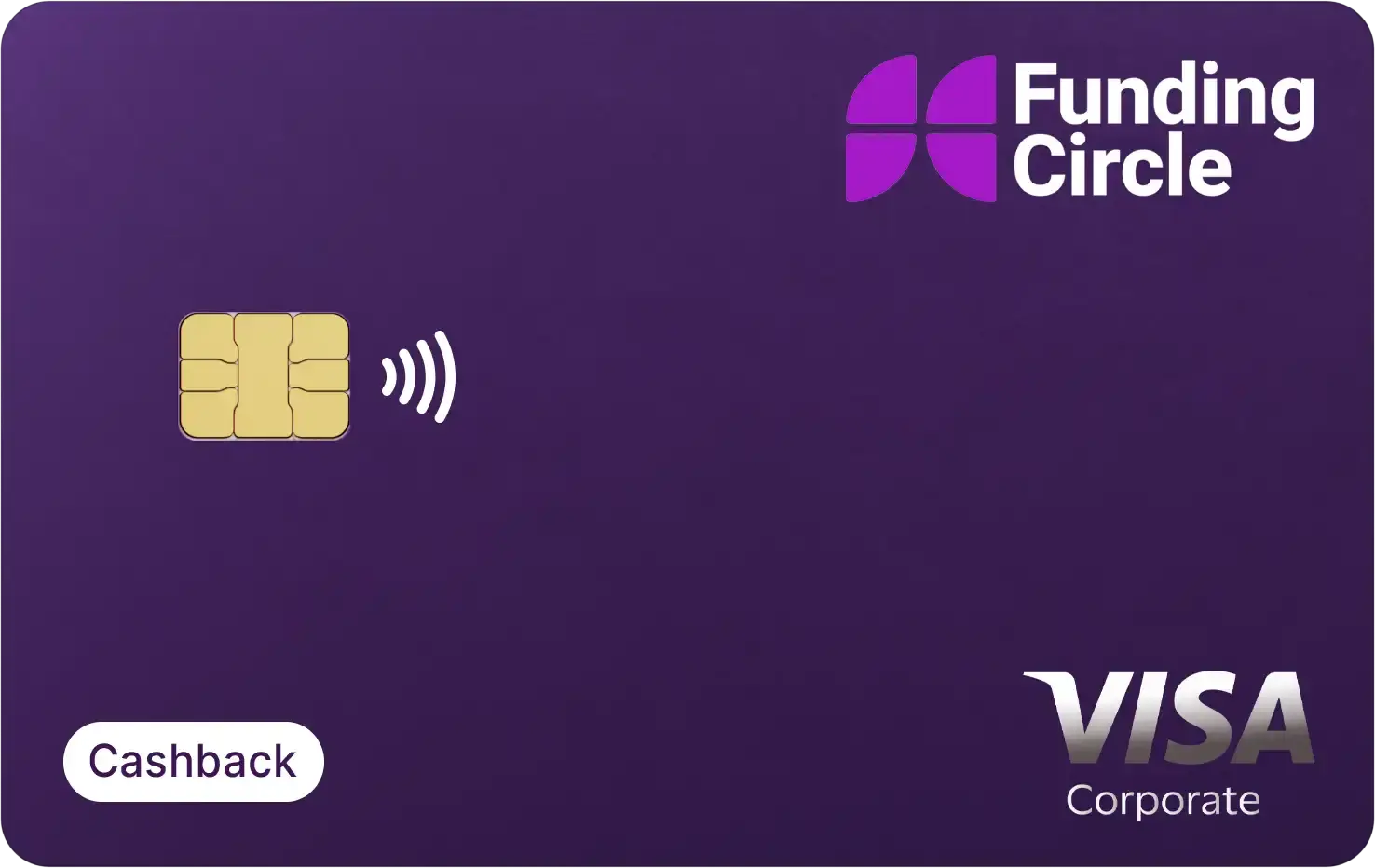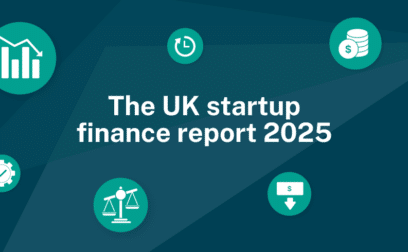Credit facility of up to £250,000
TABLE OF CONTENTS
Business credit cards works in a similar way to a personal credit card but is held by a business rather than an individual. Businesses of any size can use a business credit card, from startups, sole traders and small businesses, to big corporations and limited companies.
Capital on Tap

Uncapped 1% cashback on all card spending
No annual, FX, or ATM fees
Instant approval decision
Credit facility of up to £250,000
Funding Circle

Up to 42 days interest-free
2% cashback for the first 6 months (up to £2k)
Approval within 48 hours & no monthly fee
Credit facility of up to £50,000
Register your business with Swoop and integrate your bank account for your personalised report
In similar way to a personal credit card, a business credit card is often the first lending product a business might use. Lenders often want to see some form of credit history when lending larger amounts, so a business credit card might be an easy way to prove your reliably as a borrower. It can also be a handy tool in covering short term unexpected costs when you know you have the money coming in within the repayment period receiving money through the repayment period. If you are looking for a better way to manage your business spending and to boost your company’s credit profile.

A word from Andrea
"Business credit cards are designed to help small businesses grow. They can be used to pay for things such as office equipment, advertising, marketing campaigns, existing debt, bills and much more. Credit cards give your business access to a line of credit with a fixed amount of money. There are also no set payments for the money borrowed, so you won’t need to worry about repaying the full balance every month, just the minimum payment."
A business credit card is simply a credit card designed for business purposes. Also known as a corporate credit card, a business credit card enables businesses to borrow flexibly up to their set credit limit. Businesses can pay for goods and services on the card and then pay off the amount borrowed at a later date.
A business credit card is a simple way of gaining access to working capital, improving cash flow during slower periods, or helping your business build its credit score for future loans.
Business credit cards work in the same way as personal credit cards, but the credit is in the name of the business, not the individual. Business credit cards give you access to a revolving line of credit and a set credit limit. You can then spend on the card and repay the amount borrowed in monthly instalments.
Most business credit cards offer an interest-free period on purchases for up to 56 days. If you pay off your balance in full by the statement due date, you won’t be charged interest. If not, you will usually pay interest on the remaining balance. Whatever your circumstances, you must pay at least the minimum monthly repayment to avoid paying extra fees and charges.
Some business credit cards offer additional perks such as cashback or interest-free spending for a number of months, so it’s worth factoring this in to your comparison.
A business credit card should be used for business expenses. This can include buying office supplies or furniture, paying invoices, or paying for travel and employee expenses. Using a business credit card will ensure company transactions are kept separate from personal ones.
It’s also possible to issue multiple credit cards to employees on the one account, so that they can use their card to pay for business expenses.
Interest rates on business credit cards will vary depending on the provider, but tend to be higher compared to those on personal credit cards. If your business has a good credit rating, you’re likely to be offered a more competitive interest rate.
A few business credit cards will also offer an extended interest-free period for a number of months, so you won’t need to pay interest during that time. But if you don’t qualify for one of these cards, you can still avoid paying interest by paying off your balance in full each month.

Pros
There are a number of advantages to using a business credit card, including the following benefits:

Cons
There are also several disadvantages to be aware of when considering a business credit card. These include:
Although business credit cards work in a similar way to personal credit cards, there are a number of differences to be aware of.
For a start, business credit cards tend to come with higher credit limits compared to personal credit cards as it will be based on your business income, not just your personal income. Interest rates tend to be higher too.
A business credit card can also help you build your business credit score as the credit will be in the company’s name, not your personal name. A business credit card can also be used by multiple people in your organisation.
Another important difference is that unlike personal credit cards, purchases on a business credit card will not be protected under Section 75 of the Consumer Credit Act. This means that if something goes wrong with your purchase, for example it’s faulty or doesn’t arrive, you may find it harder to get your money back. However, some card providers will offer online guarantees to cover you against fraudulent online use, or insurance to cover misuse of the card by an employee.
It can do. If your business is fairly new and has a limited credit history, some credit card providers will assess your personal credit record when determining whether to let you borrow. If a hard credit search is carried out on your personal credit record, this can cause your personal credit score to drop slightly (though it usually recovers).
Additionally, if you are the primary account holder on a business credit card and you have signed a personal guarantee, your personal credit score and your business credit score are likely to be affected by how you manage your card. If you make your repayments on time, your credit score should improve. But if you miss payments or build up a lot of debt, your personal credit score could go down.
Your personal credit score will also be affected if you are a sole trader as there will be no legal separation between your personal and business finances.
A personal guarantee will often be a requirement if you run a small business or a startup with a limited credit history. A personal guarantee is a legally binding commitment in which you agree to accept personal responsibility for repaying your business credit card if the business is unable to. Personal guarantees are usually signed by a manager, director or owner of the company.
Your first step is to check the eligibility criteria carefully to make sure you qualify. Some card providers will require you to have a minimum annual turnover and/or have been trading for a set amount of time, while others will be more flexible.
Check exactly what documents you will need when applying for your credit card – you might need to provide your estimated annual turnover, as well as copies of bank statements and business plans before your application can be accepted. You might also need to sign a personal guarantee.
Some card providers will also offer an eligibility checker to show you the cards you’re most likely to get accepted for. Because they use a “soft” search of your credit file, they won’t hurt your credit record and they can help prevent you applying for credit cards you have no chance of getting.
Yes, sole traders can get a business credit card. Just check the eligibility criteria carefully first. Note that if you’re a sole trader, there will be no legal distinction between your business and personal finances which means lenders will look at your personal credit score to determine your creditworthiness.
Yes, it is still possible to get a business credit card with bad credit, but you’re likely to have fewer providers to choose from. Those providers that are willing to accept you might offer higher interest rates and lower starting credit limits.
Note that bad credit isn’t strictly the same as a limited credit history. Limited credit usually means your business is just starting out and hasn’t borrowed before. This can make it difficult for lenders to assess your creditworthiness which is why they might look at your personal credit record instead.
If you have bad credit, on the other hand, it usually means you’ve made mistakes such as failing to pay bills on time or missing credit card or loan repayments. Lenders might be more reluctant to let you borrow again as a result.
Yes, when you apply for a business credit card, a “hard” credit search will be carried out. This is an in-depth look into your credit history and it will be visible on your credit record. This means that other companies will be able to see if you’ve been applying for credit. Too many applications for credit in a short amount of time can make you look desperate for money and suggest you have financial problems. This could deter some lenders from letting you borrow in the future.
To increase your chances of getting approved for a business credit card it’s crucial that you check the eligibility criteria carefully.
If you haven’t been trading for long and have yet to build up a business credit history, lenders might look at your personal credit score to get a sense of how reliable you are as a borrower. It’s therefore worth checking your personal credit record to see what shape it’s in. If it’s not good, there are steps you can take to improve it, including paying bills on time, checking you’re on the electoral roll and correcting any errors on your credit report.
Bear in mind that some business credit cards are easier to get accepted for than others, so if the provider offers an eligibility checker, it’s worth using this so that you understand which cards you’re most likely to get accepted for, before making your application in full.
Written by
Rachel has been writing about finance and consumer affairs for over a decade, helping people to get to grips with their finances and cut through the jargon. She's written for a range of websites and national newspapers including MoneySuperMarket, Money to the Masses, Forbes UK, and Mail on Sunday. Rachel has covered almost every financial topic, from car insurance and credit cards, to business bank accounts and mortgages.
Swoop promise
At Swoop we want to make it easy for SMEs to understand the sometimes overwhelming world of business finance and insurance. Our goal is simple – to distill complex topics, unravel jargon, offer transparent and impartial information, and empower businesses to make smart financial decisions with confidence.
Find out more about Swoop’s editorial principles by reading our editorial policy.
How easy it is to get approved for a business credit card will depend on factors such as how long you’ve been trading, your turnover and your credit history. If you’ve been trading for a number of years, have a high annual turnover and a good credit record, you’re likely to find it easier to get approved for a business credit card.
The average credit limit on a business credit card will be much higher compared to a personal credit card. Some will offer maximum credit limits of around £10,000, but others will offer limits as high as £250,000, if not more.
Yes, provided you use your business credit card carefully and repay the balance on time, you’ll be able to build a business credit record. This can help you get access to better deals in the future.
When you have decided that a business credit card is right for you, the next decision is which provider to use. Which one will work best for you and your business is individual since different providers offer different rewards with, so you need to think about what you need from your business credit card.
Yes, it’s perfectly legal to use a personal credit card for business purposes. However, doing so can make it harder for budgeting and tax purposes as it can be difficult to distinguish between personal and business transactions. You are also unlikely to have as high a credit limit with a personal card.
Yes, it is possible to get approved for a business credit card if you have no revenue, but you’ll usually be required to sign a personal guarantee.
No, you will need to have a business to be able to apply for a business credit card. However, this doesn’t mean you need to be running a huge company. You can still apply for a business credit card if you’re a sole trader, for instance.
Yes, annual fees on business credit cards are tax deductible. If you complete a self-assessment tax form, allowable expenses, including business card annual fees, can be deducted from your taxable profit.
Yes, business credit card interest is tax deductible. Remember this only applies to business credit cards and interest associated with business expenditure, not personal expenses.
Related pages
Join the 110,000+ businesses just like yours getting the Swoop newsletter.
Free. No spam. Opt out whenever you like.



























We work with world class partners to help us support businesses with finance
Kingfisher Way, Silverlink Business Park, Newcastle upon Tyne, NE28 9NX, UK
View in Google MapsAberystwyth Innovation and Enterprise Campus
Gogerddan Campus
Aberystwyth University
Ceredigion
SY23 3EE
Dogpatch Labs, The CHQ Building, Custom House Quay, Dublin, Ireland
View in Google MapsSuite 801, Level 8, 84 Pitt Street, Sydney, NSW 2000, Australia
View in Google Maps43 W 23rd St, New York, NY 10010, United States
View in Google Maps21 Dreyer Street, Cape Town, South Africa, 7708
View in Google Maps
Swoop Finance Limited helps UK firms access business finance by working directly with businesses and their trusted advisors. We act as a credit broker, not a lender, and do not provide loans or finance products ourselves. We introduce applicants to a panel of lenders, equity funds, and grant agencies based on individual circumstances and creditworthiness.
Commission Disclosure: We typically receive a commission from the finance provider (either a fixed fee or a fixed percentage of the amount you receive) upon successful placement. Different providers pay different rates. For certain lenders, we may have influence over the interest rate, which can impact the total amount payable under your agreement.
Regulatory Information:
FCA: Authorised and regulated by the Financial Conduct Authority as a credit broker (FRN: 936513) and registered as an Account Information Services Provider (Ref: 833145).
ICO: Registered with the Information Commissioner’s Office (Ref: ZA600162); registration can be verified at ico.org.uk.
Company Details: Registered in England & Wales with Companies House (No. 11163382). Registered Address: The Stable Yard, Vicarage Road, Stony Stratford, Milton Keynes, MK11 1BN. VAT Number: 300080279.
Terms: All finance and quotes are subject to status, income, and terms and conditions. Applicants must be aged 18 or over. Guarantees and indemnities may be required. Please refer to our terms and conditions and our complaints procedure for further details.
Clever finance tips and the latest news
Delivered to your inbox monthly
Join the 110,000+ businesses just like yours getting the Swoop newsletter. Free. No spam. Opt out whenever you like.
Thanks for requesting a call back
a member of the team will be in touch.




